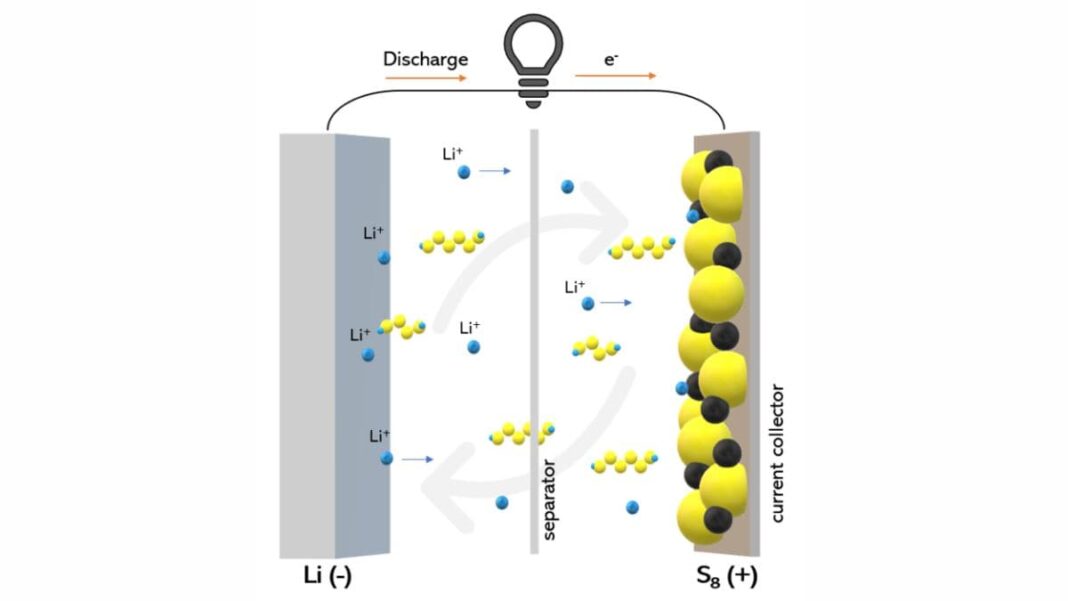Title: A Groundbreaking Advancement in Battery Technology
In a world where innovation drives progress, engineers and materials scientists have recently achieved a remarkable breakthrough in battery technology. A new lithium-sulfur battery has emerged, boasting the ability to retain 80 percent of its charge capacity after an astounding 25,000 charging cycles. This revolutionary design, featuring a specially formulated electrode, marks a significant leap forward from conventional lithium-ion batteries. The implications of this advancement are profound, promising smaller, lighter, and longer-lasting energy storage solutions that can address critical demands in electronics and electric vehicles.
Key Innovations in the Study
The study, detailed in Nature, showcases the utilization of sulfur as a core component in the battery’s solid electrode. While sulfur is abundant and cost-effective, it historically presented challenges due to issues such as ion loss and expansion during reactions with lithium. However, these obstacles were effectively overcome by incorporating a glass-like mixture comprising sulfur, boron, lithium, phosphorus, and iodine. Notably, the addition of iodine was found to enhance electron movement during redox reactions, leading to faster charging and enhanced overall performance.
As reported by Techxplore, the research highlighted the porous atomic structure of the electrode, which facilitated ion diffusion without the need for intermediary movements. This structural stability, combined with the unique chemical properties of the glass-phase electrolyte, contributed significantly to the battery’s durability across an unprecedented number of cycles.
Performance and Potential Applications
One of the standout features of the experimental lithium-sulfur battery is its ability to maintain capacity even under high temperatures, a considerable advantage in demanding environments. In contrast, standard lithium-ion batteries typically degrade after around 1,000 cycles, underscoring the remarkable longevity of this new battery. While the results are promising, the study’s authors acknowledged the importance of further research to enhance energy density and explore alternative materials that could reduce the battery’s overall weight.
Efforts are now focused on refining this technology to meet the escalating demand for energy storage across various applications, spanning from consumer electronics to renewable energy systems.
Conclusion
The development of the lithium-sulfur battery represents a monumental step forward in energy storage technology. With its exceptional longevity, enhanced performance, and potential for diverse applications, this innovation holds the promise of reshaping the landscape of energy storage solutions. As researchers continue to push boundaries and explore new frontiers, the future looks brighter than ever for advancements in battery technology.
Frequently Asked Questions
- What makes the lithium-sulfur battery different from traditional lithium-ion batteries?
- The lithium-sulfur battery boasts a significantly higher charge retention capacity, even after 25,000 charging cycles, compared to the degradation typically seen in lithium-ion batteries.
- How does the incorporation of sulfur in the battery’s electrode contribute to its performance?
- Sulfur’s unique properties, when combined with other elements in the electrode, address historical challenges related to ion loss and expansion, resulting in enhanced performance.
- What role does iodine play in the new battery design?
- Iodine enhances electron movement during redox reactions, leading to faster charging and improved overall battery performance.
- Why is the porous atomic structure of the electrode significant for ion diffusion?
- The porous structure facilitates ion diffusion without the need for intermediary movements, contributing to the battery’s durability over numerous charging cycles.
- How does the new battery perform under high temperatures?
- The experimental lithium-sulfur battery maintains its capacity even under high temperatures, making it advantageous for use in demanding environments.
- What are the potential applications of this advanced battery technology?
- The battery technology shows promise for a wide range of applications, including consumer electronics, electric vehicles, and renewable energy systems.
- What are the next steps in advancing this technology further?
- Researchers aim to improve energy density, explore alternative materials, and reduce the overall weight of the lithium-sulfur battery through further research and development.
- How does the new battery design contribute to the demand for smaller and lighter energy storage solutions?
- The breakthrough in battery technology allows for smaller, lighter, and longer-lasting energy storage solutions, catering to the critical demands in electronics and electric vehicles.
- What are the key challenges that the study’s authors acknowledge in the development of the lithium-sulfur battery?
- The study’s authors recognize the need for further research to enhance energy density and explore alternative materials to optimize the battery’s performance.
- How is the industry responding to the growing demand for energy storage solutions?
- Efforts are underway to refine the lithium-sulfur battery technology to meet the increasing demand for energy storage across various sectors, ensuring continued advancements in the field.
Tags: Battery Technology, Lithium-Sulfur Battery, Energy Storage, Innovation, Electronics, Electric Vehicles
This rewritten article showcases the groundbreaking advancements in battery technology, highlighting the potential of lithium-sulfur batteries to revolutionize energy storage solutions across various industries. With a focus on innovation, performance, and future applications, this review provides valuable insights into a pivotal development in the realm of energy storage.
- Efforts are underway to refine the lithium-sulfur battery technology to meet the increasing demand for energy storage across various sectors, ensuring continued advancements in the field.

